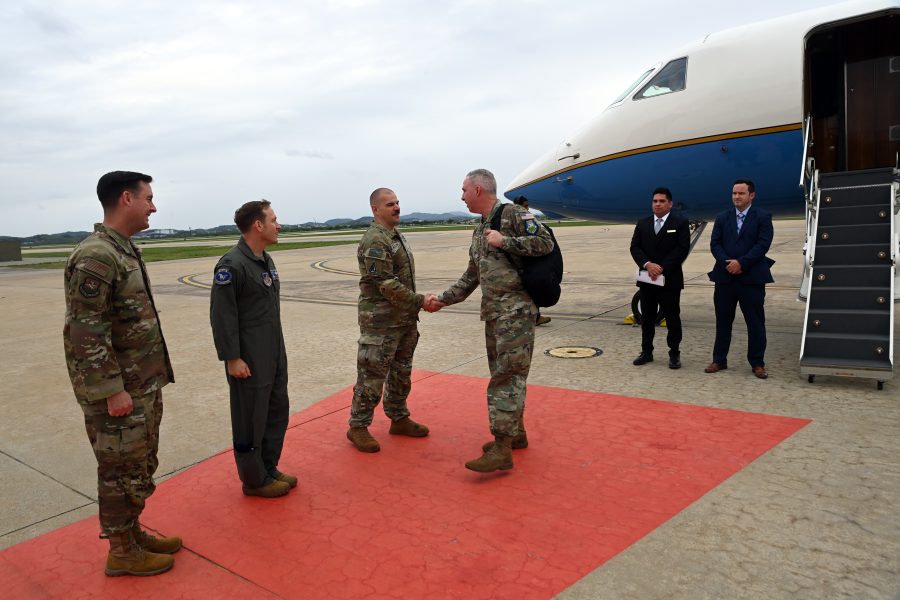In the wake of a major Chinese military shakeup, the head of U.S. Space Command warned of China’s “breathtakingly fast” advances in space during visits to Japan and South Korea.
Gen. Stephen N. Whiting’s trip to the Indo-Pacific is his first overseas visit since taking command of SPACECOM in January. His arrival in the region comes just a few days after the People’s Liberation Army announced it was disbanding its Strategic Support Force as part of “a significant reform,” wrote Brendan S. Mulvaney, director of the U.S. Air Force’s China Aerospace Studies Institute.
The People’s Liberation Army now consists of four services—the Army, Navy, Air Force, and Rocket Force—and four arms—the Aerospace, Cyberspace, Information Support, and the Joint Logistic Support Forces.
The Aerospace Force in particular is “of great significance to strengthening the capacity to safely enter, exit and openly use space, enhancing crisis management and the efficacy of comprehensive governance in space and promoting peaceful utilization of space,” Beijing’s state-run media reported.
“I have seen the reports of their recent organizational changes,” Whiting told reporters in an April 24 briefing in Tokyo. “The statements I’ve seen come out of the Chinese government is that they’ve made those changes to further enhance the importance of space and information warfare and cyber operations in the People’s Liberation Army.”
Mulvaney noted in his analysis that “the PLA adheres to a fairly strict protocol order in formal announcements, so it appears that the Aerospace Force (ASF), which commands the PLA’s space forces, is now the senior force. The ASF was formerly the Aerospace Department of the Strategic Support Force.”
More broadly, Whiting is using his visit to warn that China is developing counterspace weapons to threaten U.S. space capabilities and using space technology to enhance other PLA branches such as the Army and Air Force.
“Over the last six years they have tripled the number of intelligence, surveillance, and reconnaissance satellites on orbit, and they have used their space capabilities to improve the lethality, the precision, and the range of their terrestrial forces,” said Whiting. “That obviously is a cause for concern, and something that we are watching a very, very closely.”
Specifically, Whiting noted ties between the U.S. and Japan to monitor Chinese behavior in space.
“We are excited for the Japanese to bring on board their deep-space radar capability that they’ve been working for many years and that we’ve been partnering with them,” said Whiting. “When that achieves initial operational capability, we expect that will provide both of our countries an enhanced understanding of what China is doing in space.” Whiting also mentioned the ongoing partnership with Japan to deploy hosted payloads to conduct space domain awareness missions in a satellite factory in greater Tokyo.
While China’s growth in space is a major concern, North Korea’s emerging space ambitions are also drawing attention. Whiting engaged with South Korean leaders to talk through ways to increase joint domain awareness and keep a close eye on Pyongyang’s ongoing space projects. North Korea launched its first spy satellite in December and is planning a second launch, although there are questions regarding the capabilities of the one currently in orbit.
“We continue to see that they want to launch more satellites,” said Whiting. “We had a good discussion with Admiral Kim, the Republic of Korea chairman of the joint chiefs of staff, about how we can better collaborate together. I also had a chance to talk to the Korean Air Force commander of their Space Operations Squadron, how we could share space domain awareness information.”
Washington, Seoul, and Tokyo have been sharing missile warning data since December as part of their agreement to better track Pyongyang’s missile launches.
The Pentagon has been working to expand its partnerships in space with both nations for months now. The Space Force expects to establish a new component in Japan this year, and U.S. Space Force Korea, established in December 2022 at Osan Air Base, has been working with the Republic of Korean Air Force’s Space Operation Squadron to share data and counter threats in the region including Pyongyang’s GPS jamming through joint exercises.
